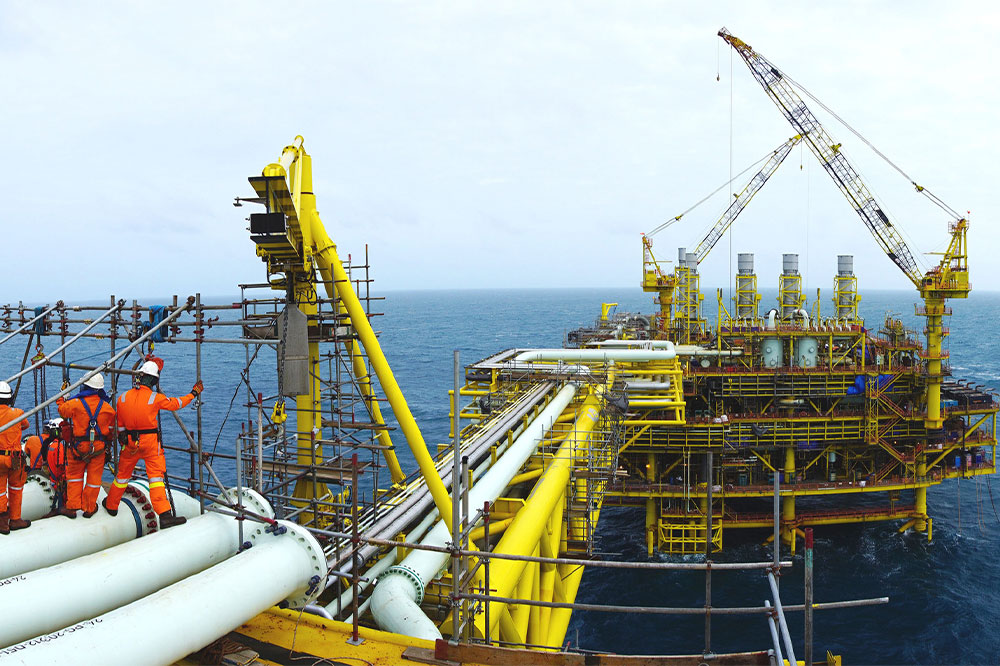Everything to know about the oil and gas industry
Oil and gas are the primary sources of fuel around the world. The energy requirements in the country are heavily dependent on this sector, with almost 70% of them being met by oil and natural gas. It is also the biggest sector in the world in terms of value—the industry is worth almost $5 trillion as per recent global estimates. So here is everything you need to know about this complex industry:

Key segments
The activities of the oil and gas industry are split into three fundamental segments:
Upstream: This segment is concerned with exploration and production. The main exploration activities are geological surveys and gaining land rights, among other activities. The goal is to find underground and underwater reservoirs of crude oil and natural gas. Crude oil is characterized by two qualities: its density which ranges from light to heavy, and its sulfur content ranging from low or sweet to high or sour. Light and sweet crude oil is more sought-after as the process of refining it is easier. Natural gas comes either in the associated form (with oil) or in the non-associated form. There are two types of natural gas: wet gas (where other hydrocarbons co-exist) and dry or pure methane. After the exploration, the production stage involves offshore and onshore drilling activities of the explored and established oil and gas wells.
Midstream: This segment covers the transportation and storage of the drilled gas and oil to refineries in different regions. Transportation is carried out using trucks, tankers, tanker ships, or pipelines.
Downstream: This segment mainly covers refining or filtration of crude oil and natural gas purification. The sector also involves the sale of fuels to the end-users. The finished products are available in the form of petrol, diesel, natural gas, gasoline, kerosene, liquid petroleum gas, lubricants, jet fuel, heating oil, and many other forms of petrochemicals.
Apart from these three segments, other business entities are responsible for well servicing. These companies are hired on contract to ensure proper maintenance of the fields and carry out construction-related activities as required at the site. An integrated oil company is a company that is engaged in two or more of the above-mentioned segments.
Chemical composition of fuels
Both oil and gas are made up of hydrocarbons, which are organic compounds formed from the remains of dead flora and fauna that make up sedimentary rocks in the Earth’s crust. These compounds form natural gas and oil when exposed to certain temperatures and pressures. Oil fields and natural gas reservoirs typically form at places where these compounds have migrated and are trapped under less-porous cap rocks. The cap rocks need to be drilled so that the hydrocarbons can be pumped to the Earth’s surface.
Measurements
Oil production is measured in barrels or bbl by Exploration & Production companies. The daily production quantity is indicated using barrels per day, and quarterly production is indicated as barrels per quarter. MMbbl is used to denote 1 million barrels, and the unit to denote 1,000 barrels is Mbbl. Further, 1 barrel or bbl is equal to 42 gallons of oil. Gas production is measured in cubic feet or cf. MMcf indicated 1 million cubic feet of gas, Bcf means 1 billion cubic feet, and Tcf denotes 1 trillion cubic feet of gas.
Understanding oil reserves
Oil reserves are sites that are confirmed to have natural gas and oil deposits, but the extraction work at the sites is yet to begin. Such reserves are categorized using three Ps, namely:
- Proven: The sites that offer 90% certainty of oil production.
- Probable: The sites that have a 50% chance of oil production.
- Possible: Those that have only a 10% certainty of having enough oil for production.
Domestic status quo
The country is the largest producer of crude oil in the world and the 3rd largest petroleum producer. Of the 50 states, almost 20 contribute significantly to oil and natural gas production in the country. Further, 14 of the remaining 30 states make minor contributions to the industry. There are 500,000 wells, four thousand platforms, 144 refineries, and 16,000 establishments in the country. As a result, the country is considered energy-independent or self-sufficient on a net energy basis. The industry not only caters to domestic requirements but also exports a good amount of fuel. Other countries known for oil and natural gas production are Saudi Arabia, China, Canada, and Russia.
With an increasing demand for fuels in recent times, the pursuit of sustainable oil and gas production processes is on the rise. In this context, the production of natural gas has gained prominence because of lower greenhouse gas emissions.